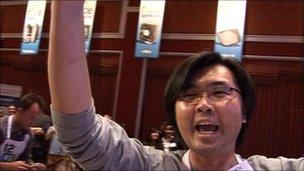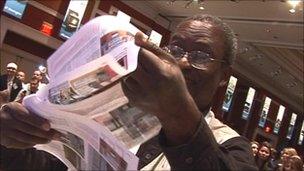Tech Know: The sport of geeks
- Published
LJ Rich meets the technology journalists at a Las Vegas race to build a computer in a matter of minutes.
I'm nervous. My palms are sweaty and my heart is racing. I've got 10 minutes to prepare for a race that, 30 minutes ago, I didn't even know I was taking part in.
I've found out so late that I've almost missed the pre-race briefing - a briefing that veterans of this race that I interviewed earlier told me was unmissable if you were taking part.
Add to that the fact that nature and upbringing have not conspired to make me any kind of athlete.
The only race I've ever won was the obstacle race at junior school when a catastrophic error at the beanbag toss by favourite Peter Reilly let me, thanks to my long legs, sneak first place.
I'm more the indoor-pursuits-with-no-heavy-lifting type of guy. Yet here I am, girding an apron around my flabby torso getting ready to compete.
At least it's all for a good cause.
The race in question is held every year in Las Vegas to find out who can build a PC the fastest. The complete PCs, 30 in total, will then be donated by organisers CA and Systemax to the National Center for Missing and Exploited Children.
Be prepared

Stephen Fung celebrates being the first to finish building the PC
In the run-up to the event, I talked to old and new competitors to find out how they approach the event. The event brings together hardware experts, journalists and even celebrity geeks such as iJustine.
Some competitors like Thomas Lower have not built a PC since the 2010 competition. Others, like Frank Dimmick from the Overclockers Club, do it every day. Putting together a PC from scratch, he says, is a 25-minute process.
That bald statement fills me with trepidation now I know I'm taking part. I've upgraded every PC I've ever owned so I know my way around the innards of a computer. I've even built one from scratch. However, it took me substantially longer than 25 minutes.
I miss about half of the unmissable briefing. Arriving, I'm handed a sheaf of papers that explain the steps involved in turning the pile of parts on each table into a functioning machine.
I arrive in time to hear a warning about the right way to connect up a set of particularly tricky wires. Which wires? I missed that part. And then the briefing is done.
As we stand in front of our tables full of parts and my heart rate climbs, veterans of the competition indulge in trash talk and banter. Hiawatha Bray of the Boston Globe invokes Conan in declaiming what will be best about the competition.
"To crush your enemies, see them driven before you, and to hear the lamentation of their women!"
Screwing up

Hiawatha Bray flips through the instructions for building the PC.
And we're off. First, I turn the PC on its side to make it more stable and easier to get at all the slots and screw holes. First in are the memory sticks. They snap into their slots with a satisfying click.
Next, the power cord for the motherboard. It can only go in one way and, after a glance at the connectors, I orient it correctly and it eases into place. No click but it is snug.
Now the connectors for the hard drives. Two of them, with two wires apiece. Get them wrong and it will not boot. This is the tricky part. The part I missed the briefing about.
I make a choice and go by colours. Dark blue for one and light blue for the other.
Now to screw the hard drive caddy into place. I get it in position and, in a miracle of dexterity, screw it in despite the small space, stumpy screws and chunky fingers. Then I realise. It's in back-to-front. There are penalties for parts being in the wrong way or loosely secured.
I'm unscrewing it when, suddenly, there's a commotion. Someone has finished. In a little over four minutes.
That throws me and I fumble a screw which tumbles into the PC's innards. A shake of the case and I've got it back.
Someone else has finished.
The hard drive is out, turned round and slotted back into place. More finishers. I drop the screw. Again and again I drop the screw. Seven times in all as cheers, back-slapping and congratulations break out all around.
I'm playing for pride now. Can I avoid being stone dead last?
Next is the CD-Rom drive, taking care to put power and data cables in first. Sound card, graphics card and wi-fi card pass in a blur. They go well. But I'm in a minority now. Far more have finished than not.
Final step - power cords, monitor, mouse and keyboard. Then I hit the power button and realise - I have no idea if it will work.
It does.
It boots, pings the competition server to get my time. 12 minutes, 47 seconds. I finished 21st out of 30. I even beat some veterans.
My joy is short-lived as I see that the winner, Steven Fung, finished in four minutes, nine seconds. Chatting to him afterwards, my self esteem sinks further.
"I could have gone faster," he said. "I made a few mistakes on the way."
So did I. And I know I can do better. I also know a few tricks now to shave seconds, maybe minutes, off that time.
Next year. Next year I will crush my enemies, trample them before me and hear the lamentation of their women. This year, though, I'll settle for 21st place, a small glow of pride and a celebratory cocktail. It is Las Vegas, after all.